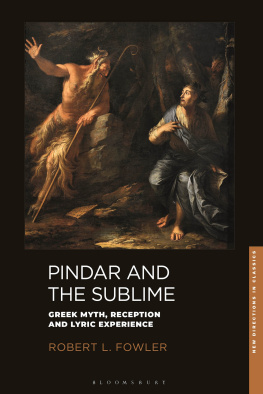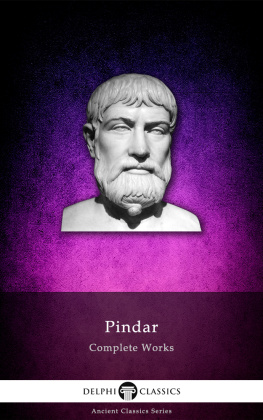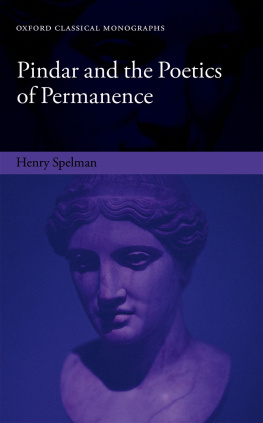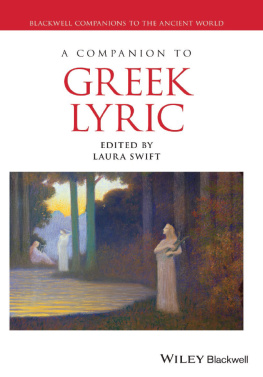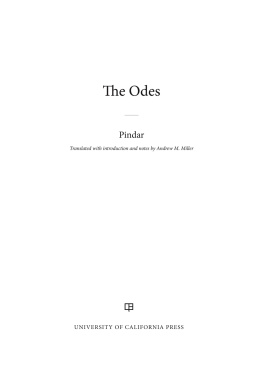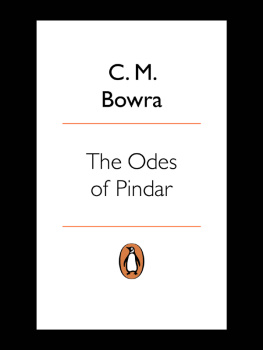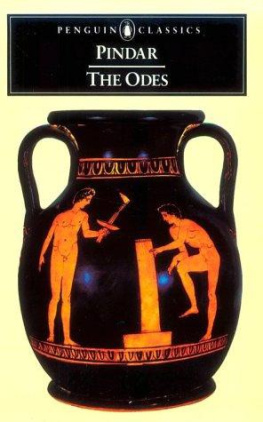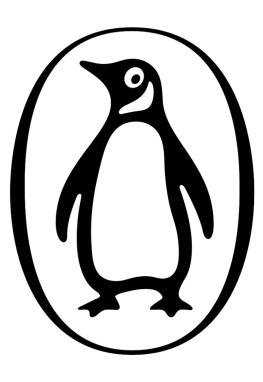Robert L. Fowler - Pindar and the sublime : Greek myth, reception, and lyric experience
Here you can read online Robert L. Fowler - Pindar and the sublime : Greek myth, reception, and lyric experience full text of the book (entire story) in english for free. Download pdf and epub, get meaning, cover and reviews about this ebook. year: 2022, publisher: Bloomsbury UK, genre: Religion. Description of the work, (preface) as well as reviews are available. Best literature library LitArk.com created for fans of good reading and offers a wide selection of genres:
Romance novel
Science fiction
Adventure
Detective
Science
History
Home and family
Prose
Art
Politics
Computer
Non-fiction
Religion
Business
Children
Humor
Choose a favorite category and find really read worthwhile books. Enjoy immersion in the world of imagination, feel the emotions of the characters or learn something new for yourself, make an fascinating discovery.
- Book:Pindar and the sublime : Greek myth, reception, and lyric experience
- Author:
- Publisher:Bloomsbury UK
- Genre:
- Year:2022
- Rating:5 / 5
- Favourites:Add to favourites
- Your mark:
- 100
- 1
- 2
- 3
- 4
- 5
Pindar and the sublime : Greek myth, reception, and lyric experience: summary, description and annotation
We offer to read an annotation, description, summary or preface (depends on what the author of the book "Pindar and the sublime : Greek myth, reception, and lyric experience" wrote himself). If you haven't found the necessary information about the book — write in the comments, we will try to find it.
Pindar and the sublime : Greek myth, reception, and lyric experience — read online for free the complete book (whole text) full work
Below is the text of the book, divided by pages. System saving the place of the last page read, allows you to conveniently read the book "Pindar and the sublime : Greek myth, reception, and lyric experience" online for free, without having to search again every time where you left off. Put a bookmark, and you can go to the page where you finished reading at any time.
Font size:
Interval:
Bookmark:
NEW DIRECTIONS IN CLASSICS
New Directions in Classics is a series of short monographs on Classical antiquity and its reception, covering subjects from across the entire spectrum of ancient Mediterranean culture, including its literature, history, material survivals and their afterlife in diverse media. These volumes move the discipline of Classics forward by breaking new ground, whether in their combination of sources or their method, and by presenting pluralist studies that blend and transcend modes of analysis that have enriched Classics, broadly defined, in recent decades. As fresh and stimulating takes on their topics they are characterized by their dynamism, intellectual energy and interdisciplinary scope, and are accessible without compromising on academic rigour.
Editors
Nora Goldschmidt (Durham University)
Fiachra Mac Grin (University College London)
Charles Martindale (University of Bristol)
Editorial Board
George Boys-Stones (University of Toronto)
Joy Connolly (The Graduate Center, CUNY)
Stuart Gillespie (University of Glasgow)
Barbara Graziosi (Princeton University)
Duncan F. Kennedy (University of Bristol)
Miriam Leonard (University College London)
Nicoletta Momigliano (University of Bristol)
Neville Morley (University of Exeter)
Robin Osborne (University of Cambridge)
Richard Thomas (Harvard University)
Greg Woolf (University of California, Los Angeles)
Titles in the series
Antiquity and the Meanings of Time: A Philosophy of Ancient and Modern Literature, Duncan F. Kennedy
In Search of the Labyrinth: The Cultural Legacy of Minoan Crete, Nicoletta Momigliano
The Modernity of Ancient Sculpture: Greek Sculpture and Modern Art from Winckelmann to Picasso, Elizabeth Prettejohn
Thucydides and the Idea of History, Neville Morley

poetry of the archaic and classical periods (seventh to late fourth centuries BCE ), was occasional poetry had always been known, but scholars did not begin fully to explore the implications of this fact until the 1960s. It is hard to overstate the impact of this development; the results were revelatory and transformative. I use them everywhere in this book.
What I missed more and more, however, was discussion of Pindar as a poet, which is, after all, how he had been read for millennia before. We have had large quantities of outstanding work on Pindar and athletics, Pindar and the polis, Pindar and his patrons and so on, but much less on the aesthetics of the poetry. At times, indeed, such discussion seemed actively discouraged, unless it aided understanding of how Pindar delivered his commission on the day of performance. Any hint of a Romantic sensibility in reading Pindars I, for instance, would be denounced as an anachronism, and this was a heresy we had been taught as undergraduates to fear above all others. Now no one would advocate reading Pindar just as if he were Wordsworth (although trying it out might be instructive). Or Wordsworth as if he were Eliot, for that matter. But some of the reasons for which we still read Wordsworth are the same as the reasons for which we still read Pindar, and the methodological challenge is to assess the aesthetics both historically and transhistorically.
Recently, as so often happens in the humanities, the pendulum has started to swing, and people have been addressing themselves to aspects of that issue. My work aligns itself in this respect with the work of scholars such as Felix Budelmann, David Fearn, Boris Maslov, Mark Payne, Tom Phillips, Asya Sigelman, Henry Spelman and Anna Uhlig, different from each other though they are in many ways, and each of whom would doubtless take issue with various parts of the argument. Of non-classicists I have found the work of Wayne Booth, Jonathan Culler and Kte Hamburger particularly congenial. Research on the reperformance of epinician poetry, such as that of Lucia Athanassaki, Christopher Carey, Bruno Currie and Andrew Morrison, also forms an important contribution to this general picture. Earlier, David Carne-Ross had protested that Pindar was, after all, a poet, a protest implicitly affirmed already by Michael Silk in his 1974 book on poetic imagery, and registered alta voce in other publications thereafter.
There are many things one could say under the rubric Pindar as poet, but in thinking about my own engagement with him, the notion of the sublime captured most of what I wanted to say. As a topic of interest the sublime too has seen its ebbs and flows. In modern literary and philosophical studies, ennui seemed to set in during the early years of this century, to see a revival in the second decade. In the introduction to his edited collection of 2012, Timothy Costelloe amusingly quotes several authorities who had declared in their collective terminology, the sublime anaemic, bourgeois, elitist, feeble, ideological, ineffective, irrelevant, irresponsible, nostalgic, poor, and weak in a word, dead.
After nearly six decades of writing Longinian criticism, concluded Harold Burke found room for both literature and philosophy in his treatise on the sublime. After Kant, the two streams come triumphantly together in Schiller, and, of inestimable importance for Pindar, in the poet and philosopher Friedrich Hlderlin.
In Chapter 1 I have sought to tell this story, concisely in respect of the number of texts and writers but still at some length, in order to bring out the themes that inform my reading of both Hlderlin and Pindar. Hlderlin in this narrative constitutes a kind of telos. After him, undeniably, in both Germany and elsewhere interest in Pindar waned amongst the literati, to recover again in the early twentieth century with the emergence of Hlderlins unpublished poems and essays. I trust, however, that the narrative will not seem teleological in a hard sense. Hlderlin is just as easily seen as a diversion in a line that leads more directly from Kant to postmodernism (if one is to think in terms of lines at all). Some day I may write about Lyotard and others; apart from problems of representation, the sublimity of objects is a topic on which much more could be said than I have done in this book (though I make a start with the golden lyre of the first Pythian).
The second and third chapters explore both literary and philosophical aspects of the sublime in Pindar, following the programme laid out at the end of Chapter 1. Chapter 2 springs from Longinus remark (On the Sublime, ch. 7) about the mind being filled with the sublime, and how we share the writers passion. Pindar to an extraordinary degree has the ability to draw his reader in, and make us want to be there on that magical first occasion. The occasion, for us, is a matter of the text, and the drawing-in is due entirely to the poet as he presents himself in, and works through, his text. Consequently, since these are two primary drivers of Pindars sublime, a thorough exploration seemed justified of the persona and the occasion as they exist in the text. Pindars I has already been the subject of long debate, while the occasion as experienced by audiences after the premiere has been a more recent topic of discussion. By bringing these two together I hope to have added some new considerations to the debate, and more importantly to suggest some new readings of Pindaric passages. I make space in this chapter also briefly to discuss a more general problem in aesthetics, which is whether a purely aesthetic judgement is possible, and how this affects the appreciation of Pindars sublime, given the antipathy some readers have felt towards his politics.
Font size:
Interval:
Bookmark:
Similar books «Pindar and the sublime : Greek myth, reception, and lyric experience»
Look at similar books to Pindar and the sublime : Greek myth, reception, and lyric experience. We have selected literature similar in name and meaning in the hope of providing readers with more options to find new, interesting, not yet read works.
Discussion, reviews of the book Pindar and the sublime : Greek myth, reception, and lyric experience and just readers' own opinions. Leave your comments, write what you think about the work, its meaning or the main characters. Specify what exactly you liked and what you didn't like, and why you think so.

